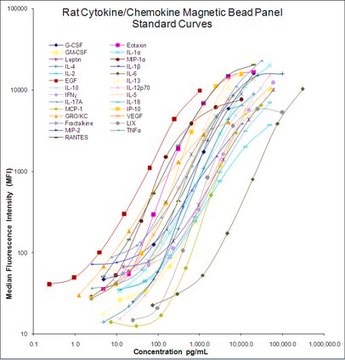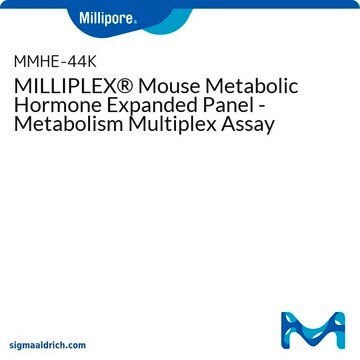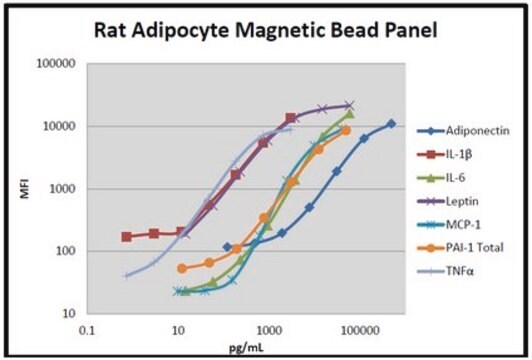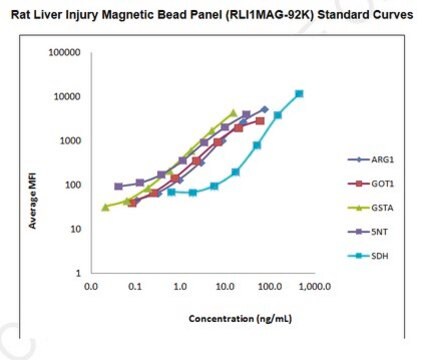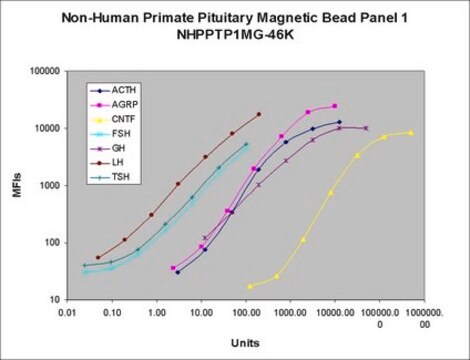RADPKMAG-80K
MILLIPLEX® Rat Adipokine Panel - Metabolism Assay
About This Item
Recommended Products
species reactivity
rat
Quality Level
manufacturer/tradename
Milliplex®
assay range
accuracy: 94-119%
sensitivity: 0.3-17 pg/mL
(MinDC)
standard curve range: 0.7-3,000 pg/mL
(IL-1β, TNFα)
standard curve range: 12-50,000 pg/mL
(PAI-1)
standard curve range: 15-60,000 pg/mL
(IL-6, Leptin)
standard curve range: 24-100,000 pg/mL
(Insulin)
standard curve range: 9.8-40,000 pg/mL
(MCP-1)
technique(s)
multiplexing: suitable
detection method
fluorometric (Luminex xMAP)
shipped in
wet ice
General description
MILLIPLEX® Rat Adipokine Magnetic Bead Panel is a seven-plex kit to be used for the simultaneous quantification of any or all of the following analytes in serum and plasma samples: IL-1β, IL-6, Insulin, Leptin, MCP-1, PAI-1, and TNFα. This kit uses a 96-well format, contains a lyophilized standard cocktail, two internal assay quality controls and can measure up to 38 samples in duplicate.
The Luminex® xMAP® platform uses a magnetic bead immunoassay format for ideal speed and sensitivity to quantitate multiple analytes simultaneously, dramatically improving productivity while conserving valuable sample volume.
Panel Type: Metabolism
Specificity
There was no or negligible cross-reactivity between the antibodies for an analyte and any of the other analytes in this panel.
Application
- Analytes: IL-1β, IL-6, Insulin, Leptin, MCP-1 (CCL2), PAI-1 (Total), TNFα
- Recommended Sample Type: Rat serum or plasma
- Recommended Sample Dilution: 25 μL per well of undiluted serum or plasma
- Assay Run Time: Overnight (16-18) hours at 2-8°C
- Research Category: Metabolism
- Research Subcategory: Endocrine; Obesity; Metabolic Disease
Features and Benefits
Packaging
Components
Rat Adipokine Quality Control 1, 1 vial, lyophilized
Rat Adipokine Quality Control 2, 1 vial, lyophilized
Assay Buffer, 1 bottle, 30 mL
Bead Diluent, 1 vial, 3.5 mL
Wash Buffer, 10X (0.05% Proclin), 2 bottles, 30 mL ea
Rat Adipokine Detection Antibodies, 1 bottle, 5.5 mL
Streptavidin-Phycoerythrin, 1 bottle, 5.5 mL
Mixing Bottle, 1 bottle
Sample Plate, 96 well format, 1 plate
2 Foil Plate Sealers
Storage and Stability
Other Notes
Legal Information
Disclaimer
Signal Word
Danger
Hazard Statements
Precautionary Statements
Hazard Classifications
Acute Tox. 3 Dermal - Acute Tox. 4 Inhalation - Acute Tox. 4 Oral - Aquatic Chronic 2 - Eye Irrit. 2 - Skin Sens. 1
Storage Class Code
6.1C - Combustible acute toxic Cat.3 / toxic compounds or compounds which causing chronic effects
Certificates of Analysis (COA)
Search for Certificates of Analysis (COA) by entering the products Lot/Batch Number. Lot and Batch Numbers can be found on a product’s label following the words ‘Lot’ or ‘Batch’.
Already Own This Product?
Find documentation for the products that you have recently purchased in the Document Library.
Related Content
Multiplex immunoassays save time and sample volume in metabolic syndrome research, providing comprehensive insights into related conditions.
Our team of scientists has experience in all areas of research including Life Science, Material Science, Chemical Synthesis, Chromatography, Analytical and many others.
Contact Technical Service